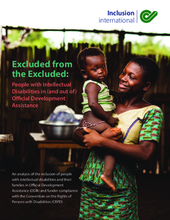Although governments have committed to ensuring “no one left behind” in line with the Sustainable Development Goals (SDGs), the Convention on the Rights of Persons with Disabilities (CRPD), and commitments made at the 2018 Global Disability Summit, international development and aid continues to exclude people with intellectual disabilities and their families.
This report analyzes data available through the Organization for Economic Cooperation and Development (OECD) Development Assistance Committee (DAC)’s Creditor Reporting System (CRS), which reveals that mainstream development projects fail to include people with intellectual disabilities, and in many cases use project methodologies that promote segregation and other human rights violations.
ODA data from 2014 through 2018 reveals that:
- People with intellectual disabilities are excluded from nearly all projects funded through official development assistance - 99.98% of ODA funding between 2014 and 2018 did not include people with intellectual disabilities. Even within the small base of projects that did include other people with disabilities (such as cross-disability projects), people with intellectual disabilities as a marginalized group are still excluded over 98% of the time.
- Rather than working to advance the rights of people with intellectual disabilities, 36% of the Official Development Assistance that included people with intellectual disabilities in 2018 was not CRPD-compliant, contributing to segregation and other human rights violations. Donors continue to fund projects and activities that violate the rights of people with intellectual disabilities as outlined in the Convention on the Rights of Persons with Disabilities.
- Organizations that represent and are led by people with disabilities (OPDs) are rarely the primary delivery channel for aid – only 2% of aid relevant to people with intellectual disabilities and their families (which makes up only 0.02% of overall ODA) was delivered through OPDs.
This report recommends urgent action from donors to ensure that the commitment to disability-inclusive development is also fulfilled for people with intellectual disabilities.
The report includes guidance for ensuring CRPD-compliant project funding, including examples of community living projects that align with the CRPD, such as supporting the transition of people with disabilities from institutions to independent living and providing training for families on supporting their children with disabilities at home.

